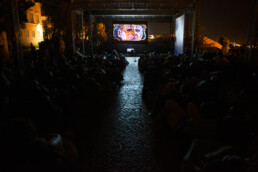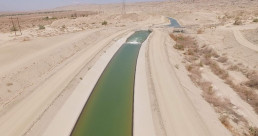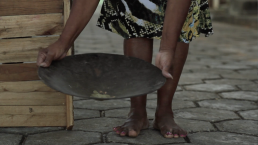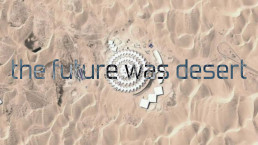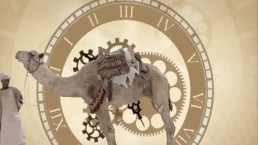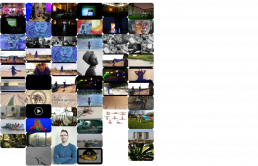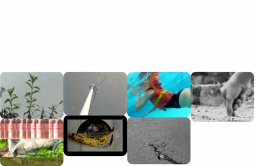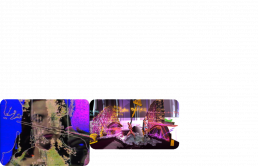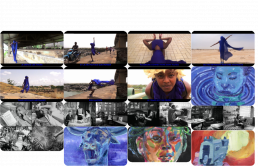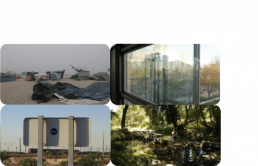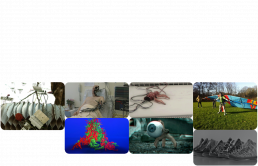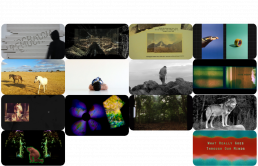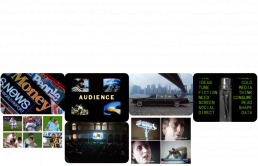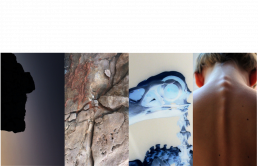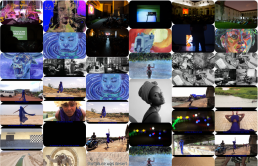“FUSO 2019 – 27 Agosto a 1 Setembro
31 Agosto, 11:15pm
Jardim do Museu Nacional de Arte Antiga
Programa de MARGARIDA MENDES (Portugal)
HIDROLÓGICAS
Duração: 54’
O pó proveniente da depressão de Bodélé no quase desertificado lago Chad, localizado no sul do Sahara, surge como uma poeira mágica, viajando quilómetros através do oceano para se tornar no fertilizante essencial de um dos mais exuberantes ecossistemas do planeta, a Amazónia. Desta região agora inóspita na África Central, surge este elixir nutritivo que, galgando a atmosfera, vem sedimentar-se como o subconsciente fértil da floresta em transição. Este subtil balanço de essências em movimento, é explorado por Adrian Lahoud nas suas investigações sobre escala, aerossóis e violência climática, quando apela à nossa compreensão para as componentes dinâmicas das fronteiras planetárias, as mesmas nunca unas e em permanente desequilíbrio e negociação.
O intercâmbio entre as valências de cada elemento planetário, a sua função, metabolismo e regulação está inserido em múltiplas escalas de intervenção. Quando iniciamos a discussão sobre a sustentabilidade ampliamos o espectro destas escalas, para a concepção humana do impacto social, económico e ambiental de cada elemento. Com o avanço da noção de capital natural, a mentalidade corporativa tem reequacionado o vocabulário e o espectro como a natureza é inserida numa equação orientada para o progresso. Mas poderá o mundo natural ser medido e projectado a partir de uma visão refractada e dividida? E como serão inseridas diferentes concepções de natureza nesta equação – incluindo visões plurais e polifónicas, que abrangem cosmovisões não ocidentais e a perspectiva do não-humano?
Nesta sessão dedicada à hidrológica viajaremos das monoculturas do Vale Imperial Californiano alimentado pelo Rio Colorado, até aos extensos complexos de barragens de Itaipu, Belo Monte e Bento Rodrigues no Brasil, terminando no deserto do Golfo Persa. Numa viagem que trespassa vários níveis de aproximação da câmara ao sujeito natural – da out-of-body experience ao registo íntimo do testemunho etnográfico – assistiremos a diferentes multiplicações de natureza, ela mesma refractada e nunca estanque, incomensurável e por vezes ficcionada. Navegando o hiato cósmico da partícula que se desenvolve, desintegra e reencarna, investigaremos a dimensão fluída dos ecossistemas planetários, perspectivando a noção de escala e a nossa própria posição, nesta permanente equação em fluxo.
BIO
Margarida Mendes (Portugal) é curadora e investigadora, vive em Lisboa. A sua pesquisa – com enfoque no cruzamento da cibernética, filosofia, ecologia e filme experimental – explora as transformações dinâmicas do ambiente e o seu impacto nas estruturas sociais e no campo da produção cultural. Integrou na equipa curatorial da 11ª Bienal de Gwangju (2016) e da 4ª Bienal de Design de Istambul (2018). Dirigiu também diversas plataformas educacionais, como escuelita, uma escola informal do Centro de Arte Dos de Mayo – CA2M, Madrid (2017); O espaço de projectos The Barber Shop em Lisboa dedicado à pesquisa transdisciplinar (2009-16); e a plataforma de pesquisa curatorial sobre ecologia The World In Which We Occur (2014-18). Margarida Mendes é doutoranda no Centre for Research Architecture, Goldsmiths University of London com o projecto Deep Sea Spectrum e uma frequente colaboradora do canal online de vídeo reportagem Inhabitants.
_ LUKAS MARXT (AT) // Imperial Valley (Cultivated Run-Off), 2018, 14’
Imperial Valley representa uma das regiões de agricultura industrial mais importantes da Califórnia. Os interesses da produção agrícola em massa conseguiram cultivar e explorar esta parte geológica do deserto de Sonora, através de um gigante sistema de irrigação, alimentado pelo Rio Colorado, assim como pelo canal All-American, especificamente criado para este efeito, sendo agora negativamente reconhecido pelo movimento migratório de comunidades mexicanas. O escoamento do sistema é feito através de tubagens, bombas e canais que seguem até Salton Sea, um lago artificial na eminência de uma catástrofe ecológica e económica, bem como as regiões fronteiriças do México.
Cortesia do artista, SixPack Film
BIO
Lukas Marxt nasceu na região de Steiermark, na Áustria, em 1983. Estudou Geografia e Ciências do Sistema Ambiental até 2004. Lukas mudou para Design Audiovisual na Universidade de Arte e Design em Linz. Entre 2007 e 2008, estudou Arte e Multimédia na Faculdade de Belas-Artes em Lisboa, Portugal. Em 2009 fez a sua pós-graduação na Academia de Artes Media em Colónia e fez um mestrado na Academia de Belas-Artes (HGB) em Leipzig. Actualmente, colabora com o Center for Land Use Interpretation, em Los Angeles.
_ CAROLINA CAYCEDO (CO) // A Gente Rio/We River, 2016, 29’30’’
A Gente Rio relaciona a Barragem de Itaipu, a segunda maior central hidroeléctrica do mundo e cujo processo de expropriação de terras foi um catalisador para a criação do Movimento dos Trabalhadores Rurais Sem Terra (MST); a Barragem de Belo Monte no Rio Xingu, cujo processo de licenciamento ambiental foi marcado por diversas irregularidades e profunda resistência da população indígena; a Barragem Bento Rodrigues, que colapsou, libertando resíduos perigosos da empresa de extracção mineira Samarco, causando uma catástrofe ambiental no Brasil sem precedentes; e, por fim, o Vale do Ribeira, onde a população indígena, as comunidades caiçara e quilombola, resistiram contra a construção de uma barragem. A artista destaca o conhecimento das comunidades, na construção de um organismo colectivo que resiste à extinção imposta por projectos orientados para o desenvolvimento.
Cortesia da artista | Comissionado pela 32ª Bienal de São Paulo – Incerteza Viva
BIO
Carolina Caycedo é uma artista colombiana que vive em Los Angeles. Participa em movimentos de resistência territorial, economias de solidariedade e alojamento como direitos humanos fundamentais. A sua obra contribui para a construção de uma memória histórica ambiental, como elemento fundamental para a não-repetição da violência contra entidades humanas e não humanas, e cria um debate sobre o futuro em relação a bens comuns, justiça ambiental, transição energética e biodiversidade cultural.
_ SOPHIA AL MARIA (QA/USA) // The Future Was Desert Part I, 2016, 5’17’’
_ SOPHIA AL MARIA (QA/USA) // The Future Was Desert Part II, 2016, 4’35’’
SFW, o alter ego de Sophia al Maria que viaja no tempo, faz peregrinações pelos petróglifos do deserto e outros locais de profunda história humana na Namíbia, Omã e Austrália. Os pontos de interesse incluem o deserto como máquina do tempo, como sonho futuro e Tatooine.
Cortesia da artista e The Third Line
BIO
Sophia Al Maria é uma artista, escritora e realizadora. Nos últimos anos, Sophia tem realizado pesquisas relacionadas com o conceito de Futurismo do Golfo. Os seus interesses principais baseiam-se no isolamento dos indivíduos através da tecnologia e do Islão reaccionário, os elementos corrosivos do consumismo e da indústria, o acto de apagar a história e a abordagem ofuscante de um futuro para o qual ninguém está preparado.
“FUSO 2019 – August 27 to Septembre 1“
August 31, 11:15pm
Jardim do Museu Nacional de Arte Antiga
Program by MARGARIDA MENDES (Portugal)
HYDROLOGICS
Running Time: 54’
Dust from the Bodélé depression located on the almost desertified Lake Chad, in southern Sahara, appears as magical element, traveling kilometres across the ocean to become the essential fertilizer of one of the planet’s most exuberant ecosystems, the Amazon. From this now inhospitable region in Central Africa, is provenient this nutritious elixir that, surging the atmosphere, comes to sediment the fertile subconscious of the forest in transition. This subtle balance of essences in motion is unveiled by Adrian Lahoud in his investigations on scale, aerosols and climatic violence, appealing to our understanding of the dynamic components of planetary boundaries, which are in permanent imbalance and negotiation.
The exchange between the valences of each planetary element, its function, metabolism and regulation is inserted within multiple scales of intervention. The discussion about sustainability broadened the spectrum of these scales to the human conception of the social, economic and environmental impacts of each element. Moreover, with the advancement of the concept of natural capital, the corporate mentality has re-equated the vocabulary and the scope of how nature is inserted into this progress-oriented equation. But can the natural world be measured and projected from a refracted partitioned viewpoint? How will different conceptions of nature be included in this equation – including plural and polyphonic visions, which encompass indigenous cosmovisions and the nonhuman perspective?
In this session dedicated to hydrologics we will travel from the Californian Imperial Valley’s Colorado River-fed monocultures, to the extensive dam complexes of Itaipu, Belo Monte and Bento Rodrigues in Brazil, ending in the desert of the Persian Gulf. In a journey that trespasses various camera depictions of the natural subject – from the out-of-body experience to the intimate record of the ethnographic testimony – we will see various multiplications of nature, itself refracted and never stable, incommensurable and per times fictionalized. Navigating the cosmic hiatus of the development, disintegration and reincarnation of particles, we will investigate the fluid dimension of planetary ecosystems, perspectivizing the notion of scale and our own position, in this permanent equation in flux.
BIO
Margarida Mendes (Portugal) explores in her research the overlap between cybernetics, ecology and experimental film, investigating the dynamic transformations of the environment and its impact on societal structures and cultural production. She was part of the curatorial team of the 11th Gwangju Biennale (2016) and 4th Istanbul Design Biennale (2018). In 2016 she curated the long-term research exhibition MATTER FICTIONS, at Museu Berardo, Lisbon, publishing a joint reader with Sternberg Press. She has directed several educational platforms, such as escuelita, an informal school at Centro de Arte Dos de Mayo – CA2M, Madrid (2017); The Barber Shop project space in Lisbon dedicated to transdisciplinary research (2009-16); and the ecological inquiry curatorial research platform The World In Which We Occur (2014-18). She is a PhD candidate at the Centre for Research Architecture, Goldsmiths University of London with the project Deep Sea Spectrum and is a frequent collaborator of the online channel for exploratory video and documentary reporting Inhabitants.
_ LUKAS MARXT (AT) // Imperial Valley (Cultivated Run-Off), 2018, 14’
The Imperial Valley represents one of California’s most important regions of industrial agriculture. Corporate agricultural production interests have been able to successfully cultivate and exploit this geological part of the Sonora desert through a gigantic irrigation system fed by the Colorado River, as well as the All-American Canal specifically engineered for this purpose and which attained sad notoriety through the Mexican migration movement. The system’s run-off flows through pipes, pumps and canals leading to the Salton Sea, an artificial lake that is approaching ecological as well as economic disaster, just as bordering regions of Mexico.
Courtesy of the Artist, SixPack Film
BIO
Lukas Marxt was born in the Steiermark region of Austria in 1983, he studied Geography and Environmental System Sciences in Graz until 2004. He then switched to Audiovisual design at the University of Art and Design Linz. From 2007 to 2008 he studied Art and Multimedia at the Faculdade de Belas-Artes in Lisbon, Portugal. In 2009 he took up a Postgraduate degree at the Academy of Media Arts Cologne and a Masters at the Academy of Fine Arts (HGB) in Leipzig and has been collaborating with the Center for Land Use Interpretation, LA.
_ CAROLINA CAYCEDO (CO) // A Gente Rio/We River, 2016, 29’30’’
We River puts in relation the Itaipu Dam, the second largest hydroelectric plant in the world, and whose process of land expropriation was a catalyst for the emergence of the Landless Workers’ Movement (MST); the Belo Monte Dam on the Xingu River, whose process of environmental licensing has been marked by a series of irregularities and profound indigenous resistance; the Bento Rodrigues Dam, which collapsed, releasing hazardous waste from the mining company Samarco and causing an unprecedented environmental disaster in Brazil; and, lastly, the Vale do Ribeira, where indigenous, caiçara and quilombola communities resist against the construction of a dam. The artist highlights the accumulated knowledge of the communities, in the construction of a collective body resisting the extinction imposed by development-oriented projects.
Courtesy of the Artist | Commissioned by the 32 Bienal de Sao Paulo – Incerteza Viva
BIO
Carolina Caycedo is a London-born Colombian artist, living in Los Angeles. She participates in movements of territorial resistance, solidarity economies, and housing as a human right. Her work contributes to the construction of environmental historical memory as a fundamental element for non-repetition of violence against human and non-human entities, and generates a debate about the future in relation to common goods, environmental justice, just energy transition and cultural biodiversity.
_ SOPHIA AL MARIA (QA/USA) // The Future Was Desert Part I, 2016, 5’17’’
_ SOPHIA AL MARIA (QA/USA) // The Future Was Desert Part II, 2016, 4’35’’
Sophia al Maria’s time-travelling alter ego SFW makes pilgrimages to desert petroglyphs and other sites of deep human history in Namibia, Oman and Australia. Points of interest include the desert as time machine, as future dream and as Tatooine.
Courtesy of the Artist and The Third Line
BIO
Sophia Al Maria is an artist, writer and filmmaker. For the past few years, she has been carrying out research around the concept of Gulf Futurism. Her primary interests are around the isolation of individuals via technology and reactionary Islam, the corrosive elements of consumerism and industry, and the erasure of history and the blinding approach of a future no one is ready for.
“FUSO 2019 – August 27 to Septembre 1“
August 31, 10pm
Jardim do Museu Nacional de Arte Antiga
